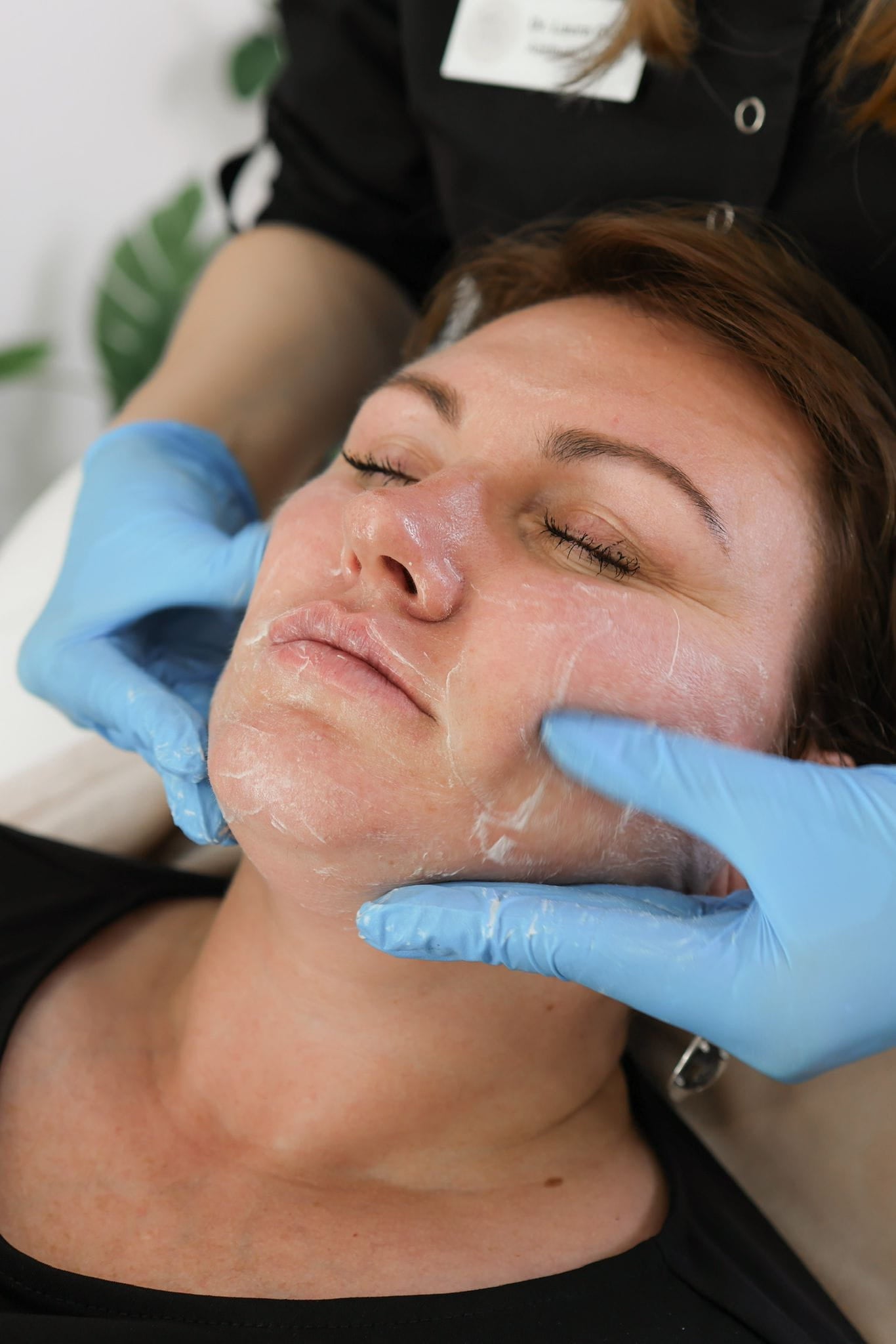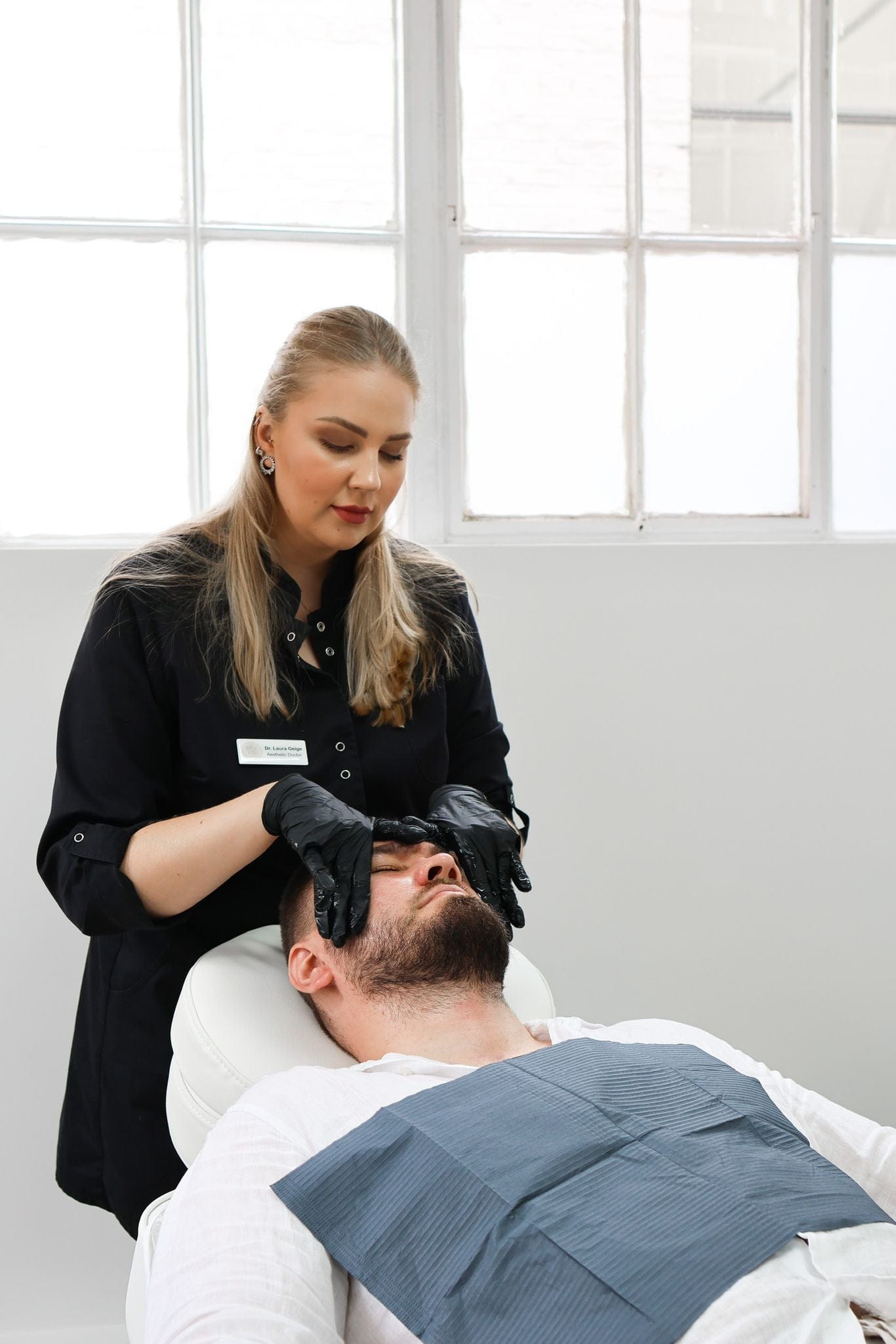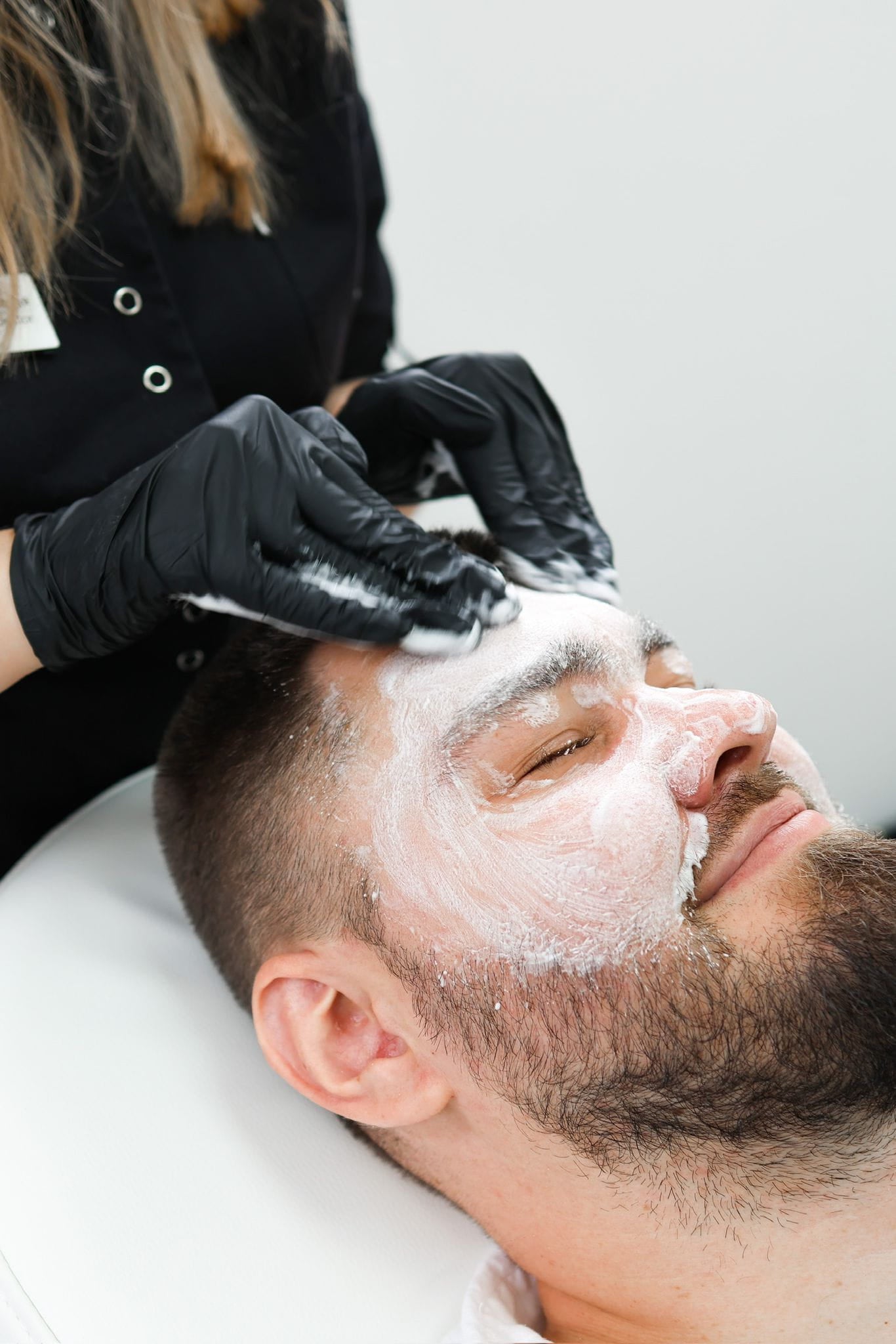Cosmelan Peel Ingredients and Mechanism
Cosmelan, a popular depigmentation peel used in the UK, contains a potent blend of active ingredients designed to address hyperpigmentation and uneven skin tone. These include hydroquinone, kojic acid, azelaic acid, and arbutin, each working synergistically to inhibit melanin production and lighten existing pigmentation.
Active Ingredients
Cosmelan’s unique formulation targets various stages of melanin production and distribution within the skin. Hydroquinone, a powerful tyrosinase inhibitor, blocks an enzyme crucial for melanin synthesis. Kojic acid also inhibits melanin production, while azelaic acid helps exfoliate dead skin cells and reduce inflammation. Arbutin, derived from bearberry, further inhibits melanogenesis and brightens existing pigmentation.
How Cosmelan Works
Cosmelan’s active ingredients work together to address hyperpigmentation at multiple stages. Hydroquinone is a potent tyrosinase inhibitor, meaning it blocks the enzyme responsible for melanin production. This directly reduces the amount of melanin produced by skin cells.
Kojic acid also inhibits melanin production, further reducing pigmentation. Azelaic acid, known for its exfoliating and anti-inflammatory properties, helps to shed dead skin cells and reduce redness associated with hyperpigmentation. Finally, arbutin, derived from bearberry, acts as a depigmenting agent by inhibiting melanogenesis (the process of melanin formation) and lightening existing pigmentation.
Safety and Risks of Cosmelan Depigmentation Peel
While Cosmelan can effectively address hyperpigmentation, its potent ingredients necessitate careful consideration regarding safety and potential risks.
Contraindications
Cosmelan’s powerful active ingredients make it effective for treating hyperpigmentation but also raise concerns about safety and potential risks.
The most significant risk associated with Cosmelan is the potential for skin irritation, redness, and peeling. These side effects are often temporary but can be severe in some cases.

Furthermore, prolonged use of hydroquinone, a key ingredient in Cosmelan, can lead to ochronosis, a condition characterized by blue-black pigmentation of the skin.
Cosmelan is contraindicated for individuals with certain skin conditions, including active acne, eczema, or psoriasis.
It’s also not recommended for pregnant or breastfeeding women due to limited safety data regarding these populations.
Individuals with a history of keloids or hypertrophic scarring should avoid Cosmelan as it may exacerbate these conditions.
Potential Side Effects
Cosmelan depigmentation peels are powerful treatments that can effectively reduce hyperpigmentation, but they also carry potential risks and side effects.
The most common side effects include skin irritation, redness, dryness, and peeling. These are often temporary and mild, but in some cases they can be more severe and require professional intervention.
Prolonged use of hydroquinone, a key ingredient in Cosmelan, can lead to ochronosis, a condition causing bluish-black pigmentation of the skin. This is a serious risk that requires careful monitoring by a dermatologist.
Cosmelan is not suitable for everyone. Individuals with certain skin conditions like active acne, eczema, or psoriasis should avoid it as it may worsen these conditions. It’s also contraindicated for pregnant and breastfeeding women due to limited safety data in these populations. Those with a history of keloids or hypertrophic scarring should also avoid Cosmelan as it may increase the likelihood of these conditions developing.
Long-Term Risks
Cosmelan depigmentation peels are powerful treatments that can effectively reduce hyperpigmentation, but they also carry potential risks and side effects.
The most common side effects include skin irritation, redness, dryness, and peeling. These are often temporary and mild, but in some cases they can be more severe and require professional intervention.
- Prolonged use of hydroquinone, a key ingredient in Cosmelan, can lead to ochronosis, a condition causing bluish-black pigmentation of the skin. This is a serious risk that requires careful monitoring by a dermatologist.
- Cosmelan is not suitable for everyone. Individuals with certain skin conditions like active acne, eczema, or psoriasis should avoid it as it may worsen these conditions.
- It’s also contraindicated for pregnant and breastfeeding women due to limited safety data in these populations.
- Those with a history of keloids or hypertrophic scarring should also avoid Cosmelan as it may increase the likelihood of these conditions developing.
Suitability for Different Skin Types
Cosmelan depigmentation peels are known for their effectiveness in treating hyperpigmentation, but their suitability varies depending on an individual’s skin type. Certain skin types may be more susceptible to side effects or have a higher risk of complications. Understanding these variations is crucial for ensuring safe and effective treatment.

Sensitive Skin
Sensitive skin requires extra caution when considering treatments like Cosmelan. The potent ingredients can potentially cause increased irritation, redness, and discomfort. Individuals with sensitive skin may experience more intense side effects compared to those with less reactive skin types.
If you have sensitive skin, it’s essential to consult with a qualified dermatologist before undergoing a Cosmelan treatment. They can assess your skin type, medical history, and any existing conditions to determine if Cosmelan is safe and suitable for you.
Dry or Dehydrated Skin
Dry or dehydrated skin can be more susceptible to irritation and sensitivity from the potent ingredients in Cosmelan. The peel’s exfoliating action may further exacerbate dryness and lead to uncomfortable tightness or flakiness.
Individuals with dry or dehydrated skin should carefully consider undergoing a Cosmelan treatment and consult with a dermatologist to discuss potential risks and alternatives.
Oily or Acne-Prone Skin
Oily or acne-prone skin can be affected by Cosmelan in various ways. While the peel’s exfoliating properties may help to unclog pores and reduce blemishes, it can also exacerbate inflammation and lead to breakouts if not carefully managed.
The active ingredients in Cosmelan can stimulate oil production, potentially worsening existing acne or causing new breakouts, particularly during the initial healing phase. It’s crucial to have a thorough consultation with a dermatologist who specializes in treating oily skin to determine if Cosmelan is suitable and to discuss strategies for minimizing potential adverse effects.
Considerations Before Using Cosmelan in the UK
Cosmelan depigmentation peels offer a popular solution for addressing hyperpigmentation in the UK, but it’s crucial to understand the considerations involved before undergoing treatment. These potent peels contain active ingredients that can effectively reduce melanin production and lighten existing pigmentation, but they also carry potential risks and side effects.
Legal and Regulatory Aspects
Before opting for a Cosmelan depigmentation peel in the UK, it’s crucial to be aware of the legal and regulatory aspects surrounding this treatment. Cosmelan is a Class IV medical device in the UK, meaning its sale and administration are subject to strict regulations.
Only qualified healthcare professionals, such as dermatologists or registered practitioners with specific training in aesthetic procedures, are legally permitted to administer Cosmelan treatments.
It’s essential to ensure that the practitioner performing your treatment is licensed and experienced in using Cosmelan to minimize the risk of adverse reactions or complications.
Furthermore, you should expect a thorough consultation prior to any treatment involving Cosmelan. The practitioner will assess your skin type, medical history, and current medications to determine if you are a suitable candidate for this particular treatment.
Qualified Practitioner Requirements
Cosmelan depigmentation peels are powerful treatments that can effectively reduce hyperpigmentation, but they also carry potential risks and side effects.
The most common side effects include skin irritation, redness, dryness, and peeling. These are often temporary and mild, but in some cases they can be more severe and require professional intervention.
- Prolonged use of hydroquinone, a key ingredient in Cosmelan, can lead to ochronosis, a condition causing bluish-black pigmentation of the skin. This is a serious risk that requires careful monitoring by a dermatologist.
- Cosmelan is not suitable for everyone. Individuals with certain skin conditions like active acne, eczema, or psoriasis should avoid it as it may worsen these conditions.
- It’s also contraindicated for pregnant and breastfeeding women due to limited safety data in these populations.
- Those with a history of keloids or hypertrophic scarring should also avoid Cosmelan as it may increase the likelihood of these conditions developing.
Cosmelan depigmentation peels are known for their effectiveness in treating hyperpigmentation, but their suitability varies depending on an individual’s skin type. Certain skin types may be more susceptible to side effects or have a higher risk of complications. Understanding these variations is crucial for ensuring safe and effective treatment.
Sensitive skin requires extra caution when considering treatments like Cosmelan. The potent ingredients can potentially cause increased irritation, redness, and discomfort. Individuals with sensitive skin may experience more intense side effects compared to those with less reactive skin types.
If you have sensitive skin, it’s essential to consult with a qualified dermatologist before undergoing a Cosmelan treatment. They can assess your skin type, medical history, and any existing conditions to determine if Cosmelan is safe and suitable for you.
Dry or dehydrated skin can be more susceptible to irritation and sensitivity from the potent ingredients in Cosmelan. The peel’s exfoliating action may further exacerbate dryness and lead to uncomfortable tightness or flakiness.
Individuals with dry or dehydrated skin should carefully consider undergoing a Cosmelan treatment and consult with a dermatologist to discuss potential risks and alternatives.
Oily or acne-prone skin can be affected by Cosmelan in various ways. While the peel’s exfoliating properties may help to unclog pores and reduce blemishes, it can also exacerbate inflammation and lead to breakouts if not carefully managed.
The active ingredients in Cosmelan can stimulate oil production, potentially worsening existing acne or causing new breakouts, particularly during the initial healing phase. It’s crucial to have a thorough consultation with a dermatologist who specializes in treating oily skin to determine if Cosmelan is suitable and to discuss strategies for minimizing potential adverse effects.
Cosmelan depigmentation peels offer a popular solution for addressing hyperpigmentation in the UK, but it’s crucial to understand the considerations involved before undergoing treatment. These potent peels contain active ingredients that can effectively reduce melanin production and lighten existing pigmentation, but they also carry potential risks and side effects.
Before opting for a Cosmelan depigmentation peel in the UK, it’s crucial to be aware of the legal and regulatory aspects surrounding this treatment. Cosmelan is a Class IV medical device in the UK, meaning its sale and administration are subject to strict regulations.
Only qualified healthcare professionals, such as dermatologists or registered practitioners with specific training in aesthetic procedures, are legally permitted to administer Cosmelan treatments.
It’s essential to ensure that the practitioner performing your treatment is licensed and experienced in using Cosmelan to minimize the risk of adverse reactions or complications.
Furthermore, you should expect a thorough consultation prior to any treatment involving Cosmelan. The practitioner will assess your skin type, medical history, and current medications to determine if you are a suitable candidate for this particular treatment.

Cost and Availability
Cosmelan depigmentation peels are a popular treatment in the UK for addressing hyperpigmentation but require careful consideration before use.
**Potential Risks and Side Effects:** While effective, Cosmelan contains potent ingredients that can cause skin irritation, redness, dryness, and peeling. Prolonged hydroquinone use, a key ingredient, may lead to ochronosis, a serious condition causing bluish-black pigmentation.
**Contraindications:** Cosmelan is not suitable for everyone. It’s contraindicated for individuals with active acne, eczema, psoriasis, pregnant or breastfeeding women, and those with a history of keloids or hypertrophic scarring.
**Cost and Availability:** The cost of Cosmelan treatments in the UK varies depending on factors like location, practitioner experience, and the number of sessions required.
Generally, expect to pay between £200-£500 per treatment session. Multiple sessions are often necessary for optimal results.
Cosmelan is available through licensed clinics and dermatologists specializing in aesthetic procedures across the UK.
Before choosing Cosmelan, consult a dermatologist for a thorough evaluation and personalized advice. They can assess your skin condition, medical history, and potential risks to determine if Cosmelan is the right treatment for you.
- Baby Botox Treatments Near Longcross, Surrey - September 4, 2025
- Alluzience Longer Lasting Botox Near Walton On The Hill, Surrey - September 3, 2025
- How Sculptra Stimulates Natural Collagen Production In Surrey - August 31, 2025
